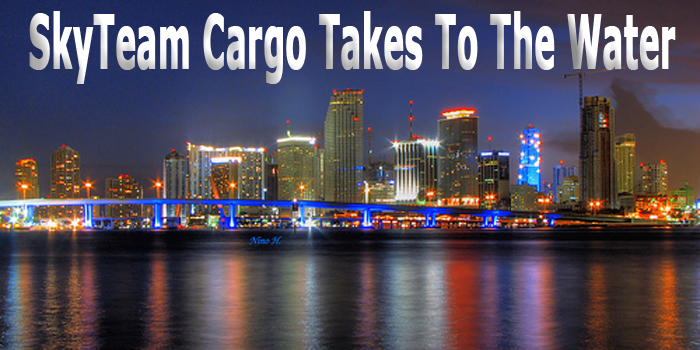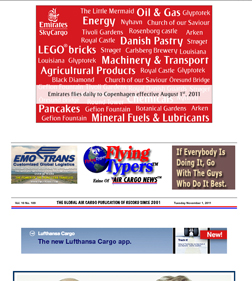| Industry Executives
Speak
At Air Cargo Americas

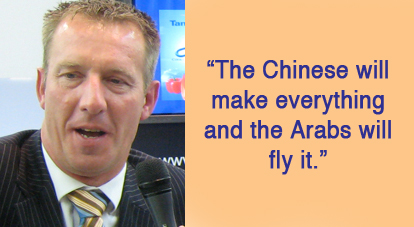 |
If the idea was to attend an air cargo
session and lower expectations, then Peter Scholten, Vice President
Commercial, Saudi Airlines Cargo blew a hole in that theory when he
stood up and told a packed audience at the principal opening meeting
of Air Cargo Americas in Miami last week:
“The Chinese will make everything
and the Arabs will fly it.”
The panel was asked to address their visions,
strategies and forecasts for the growth of the air cargo industry.
Other thoughts and replies were notable
and probably listened to with more than passing interest after the erstwhile
Scholten juiced up the joint.
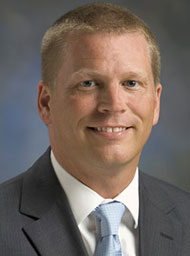 Kyle
Betterton, (left) Vice President Sales for United Cargo expressed optimism
for Latin America business growth estimated at 3.5% - 6% while demand
exceeded capacity. Beyond the UA/CO merger challenges, Mr. Betterton
listed concerns with regulation and security that will hopefully not
impact business. Kyle
Betterton, (left) Vice President Sales for United Cargo expressed optimism
for Latin America business growth estimated at 3.5% - 6% while demand
exceeded capacity. Beyond the UA/CO merger challenges, Mr. Betterton
listed concerns with regulation and security that will hopefully not
impact business.
His focus was on becoming more efficient,
reducing costs and meeting customer commitments.
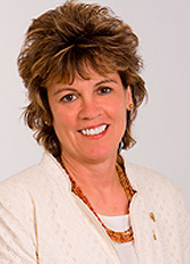 Romaine
Seguin, (right) President UPS Americas commented on the shift of manufacturing
in the auto industry from Asia to Mexico with the respective wages getting
very close when transportation was factored in. UPS had a 60% northbound
and 40% southbound traffic mix in light of 20% growth in Latin America
business, led by Mexico and followed by Brazil, Colombia and Venezuela.
Ms. Seguin in turn mentioned the infrastructure in Latin America as
a concern, particularly in roads and automation, as well as security
and transparency. Romaine
Seguin, (right) President UPS Americas commented on the shift of manufacturing
in the auto industry from Asia to Mexico with the respective wages getting
very close when transportation was factored in. UPS had a 60% northbound
and 40% southbound traffic mix in light of 20% growth in Latin America
business, led by Mexico and followed by Brazil, Colombia and Venezuela.
Ms. Seguin in turn mentioned the infrastructure in Latin America as
a concern, particularly in roads and automation, as well as security
and transparency.
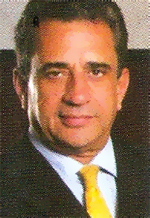 Mauricio Nieto, (left) CEO Aeroméxico
Cargo, referred to IATA figures reflecting a 6% drop in the U.S. and
5% drop in Asia while Latin America stayed very close to 2010 levels.
Mauricio Nieto, (left) CEO Aeroméxico
Cargo, referred to IATA figures reflecting a 6% drop in the U.S. and
5% drop in Asia while Latin America stayed very close to 2010 levels.
Peter Scholten, Vice President Commercial,
Saudi Airlines Cargo, as mentioned at the top here was most memorable,
noting that while operating to the U.S., his airline did yet not fly
to South America but that overall, it appeared that the Chinese will
make everything and the Arabs will fly it!
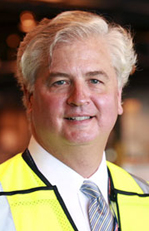 Dave Brooks, (right)President American
Airlines Cargo singled out the difficulty of being able to plan in the
face of parallel and converging events And wild oscillations in currencies,
fuel prices, earthquake and tsunami making it hard to prioritize and
invest in the right things that really added value. He went on to remark
on the changes in the flown commodities ten years ago and today –
from computers back then, to pharmaceuticals, perishables and auto parts
at the present. There was both a need and an opportunity to develop
and provide service specific products that match these goods. He remained
optimistic looking ahead.
Dave Brooks, (right)President American
Airlines Cargo singled out the difficulty of being able to plan in the
face of parallel and converging events And wild oscillations in currencies,
fuel prices, earthquake and tsunami making it hard to prioritize and
invest in the right things that really added value. He went on to remark
on the changes in the flown commodities ten years ago and today –
from computers back then, to pharmaceuticals, perishables and auto parts
at the present. There was both a need and an opportunity to develop
and provide service specific products that match these goods. He remained
optimistic looking ahead.
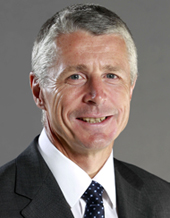 Nick
Rhodes, (left) Director Cargo Cathay Pacific, said that Asia will remain
the major manufacturing center, with added activity in Cambodia, Bangladesh
and India. Cathy was bullish and is investing heavily in aircraft, including
10 B747-800 and B777 freighters. In the short term exports from China
were down 8%-9% all the while capacity was up 20%, clearly a distortion.
His airline wants to pursue U.S. and South America markets and expected
a South America flight to be added within the next twelve months. Nick
Rhodes, (left) Director Cargo Cathay Pacific, said that Asia will remain
the major manufacturing center, with added activity in Cambodia, Bangladesh
and India. Cathy was bullish and is investing heavily in aircraft, including
10 B747-800 and B777 freighters. In the short term exports from China
were down 8%-9% all the while capacity was up 20%, clearly a distortion.
His airline wants to pursue U.S. and South America markets and expected
a South America flight to be added within the next twelve months.
Dave Brooks commented on the value of
the recently passed, albeit politically opportunistic, free trade agreements
with Panama, Colombia and South Korea, the latter with 10 billion dollars
and Colombia at one billion respectively. Furthermore, Dave cited another
example, the enormous growth over the last ten years in asparagus from
Peru and the substantial improvements in safety and security in Colombia.
Romaine added that she expected Colombia
to boom as they had a very good education system and it has become a
wonderful country to travel to.
Mauricio said that work was needed to
increase the aviation security infrastructure.
The moderator brought up the 12 billion
investment by FoxConn in Brazil to manufacture Apple products and Nick
responded saying that Foxconn had 100,000 employees in China with a
new plant in Chengdu so that the Brazil venture was to be seen to be
in addition to what is produced in China. Parts being moved around the
world represented good news in terms of bidirectional air cargo flows.
Nick noted that the infrastructure in
the U.S. has not been upgraded to accommodate B747-8 aircraft and mentioned
JFK, LAX and ORD as examples of airports which have not kept up with
the bigger aircraft.
Dave said that the infrastructure lag
was not only on the ground and that air traffic control remained a serious
constraint.
Romaine referenced Ecuador and Colombia
where funding and resources for airport growth were lagging and were
often borne by the carriers, with costs passed on to consumers.
When it came to security for air cargo,
Kyle commented that advanced intelligence-based security solutions were
needed moving forward, with the continued harmonization of global security
programs a priority. Security programs have added costs to the supply
chain.
There was agreement that upshifting the security
burden to the shipper was the right approach and that in the U.S., this
has only been embraced by pharmaceutical companies and museums, which
realized this was in their best interest. This remains a problem in
parts of the world where cargo moved in open trucks to the airport.
Kyle mentioned that UA Cargo was moving
to a new IT system for both operations and revenue management supplied
by Mercator, expected to come online in April 2012.
The development of a genuine import market
in China was a positive development, correcting previous directional
cargo flow imbalances in that market.
Ted/Geoffrey |


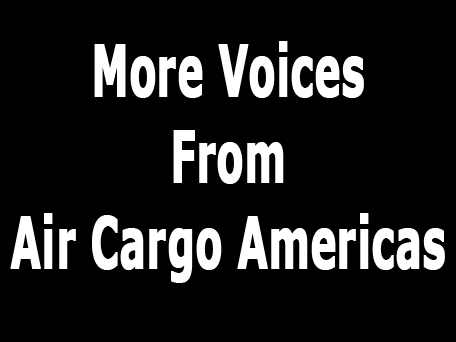
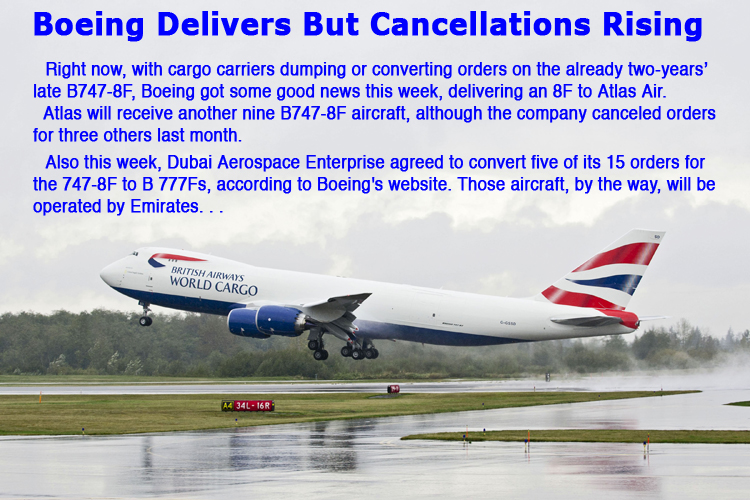



 Kyle
Betterton, (left) Vice President Sales for United Cargo expressed optimism
for Latin America business growth estimated at 3.5% - 6% while demand
exceeded capacity. Beyond the UA/CO merger challenges, Mr. Betterton
listed concerns with regulation and security that will hopefully not
impact business.
Kyle
Betterton, (left) Vice President Sales for United Cargo expressed optimism
for Latin America business growth estimated at 3.5% - 6% while demand
exceeded capacity. Beyond the UA/CO merger challenges, Mr. Betterton
listed concerns with regulation and security that will hopefully not
impact business.  Romaine
Seguin, (right) President UPS Americas commented on the shift of manufacturing
in the auto industry from Asia to Mexico with the respective wages getting
very close when transportation was factored in. UPS had a 60% northbound
and 40% southbound traffic mix in light of 20% growth in Latin America
business, led by Mexico and followed by Brazil, Colombia and Venezuela.
Ms. Seguin in turn mentioned the infrastructure in Latin America as
a concern, particularly in roads and automation, as well as security
and transparency.
Romaine
Seguin, (right) President UPS Americas commented on the shift of manufacturing
in the auto industry from Asia to Mexico with the respective wages getting
very close when transportation was factored in. UPS had a 60% northbound
and 40% southbound traffic mix in light of 20% growth in Latin America
business, led by Mexico and followed by Brazil, Colombia and Venezuela.
Ms. Seguin in turn mentioned the infrastructure in Latin America as
a concern, particularly in roads and automation, as well as security
and transparency. Mauricio Nieto, (left) CEO Aeroméxico
Cargo, referred to IATA figures reflecting a 6% drop in the U.S. and
5% drop in Asia while Latin America stayed very close to 2010 levels.
Mauricio Nieto, (left) CEO Aeroméxico
Cargo, referred to IATA figures reflecting a 6% drop in the U.S. and
5% drop in Asia while Latin America stayed very close to 2010 levels. Dave Brooks, (right)President American
Airlines Cargo singled out the difficulty of being able to plan in the
face of parallel and converging events And wild oscillations in currencies,
fuel prices, earthquake and tsunami making it hard to prioritize and
invest in the right things that really added value. He went on to remark
on the changes in the flown commodities ten years ago and today –
from computers back then, to pharmaceuticals, perishables and auto parts
at the present. There was both a need and an opportunity to develop
and provide service specific products that match these goods. He remained
optimistic looking ahead.
Dave Brooks, (right)President American
Airlines Cargo singled out the difficulty of being able to plan in the
face of parallel and converging events And wild oscillations in currencies,
fuel prices, earthquake and tsunami making it hard to prioritize and
invest in the right things that really added value. He went on to remark
on the changes in the flown commodities ten years ago and today –
from computers back then, to pharmaceuticals, perishables and auto parts
at the present. There was both a need and an opportunity to develop
and provide service specific products that match these goods. He remained
optimistic looking ahead. Nick
Rhodes, (left) Director Cargo Cathay Pacific, said that Asia will remain
the major manufacturing center, with added activity in Cambodia, Bangladesh
and India. Cathy was bullish and is investing heavily in aircraft, including
10 B747-800 and B777 freighters. In the short term exports from China
were down 8%-9% all the while capacity was up 20%, clearly a distortion.
His airline wants to pursue U.S. and South America markets and expected
a South America flight to be added within the next twelve months.
Nick
Rhodes, (left) Director Cargo Cathay Pacific, said that Asia will remain
the major manufacturing center, with added activity in Cambodia, Bangladesh
and India. Cathy was bullish and is investing heavily in aircraft, including
10 B747-800 and B777 freighters. In the short term exports from China
were down 8%-9% all the while capacity was up 20%, clearly a distortion.
His airline wants to pursue U.S. and South America markets and expected
a South America flight to be added within the next twelve months.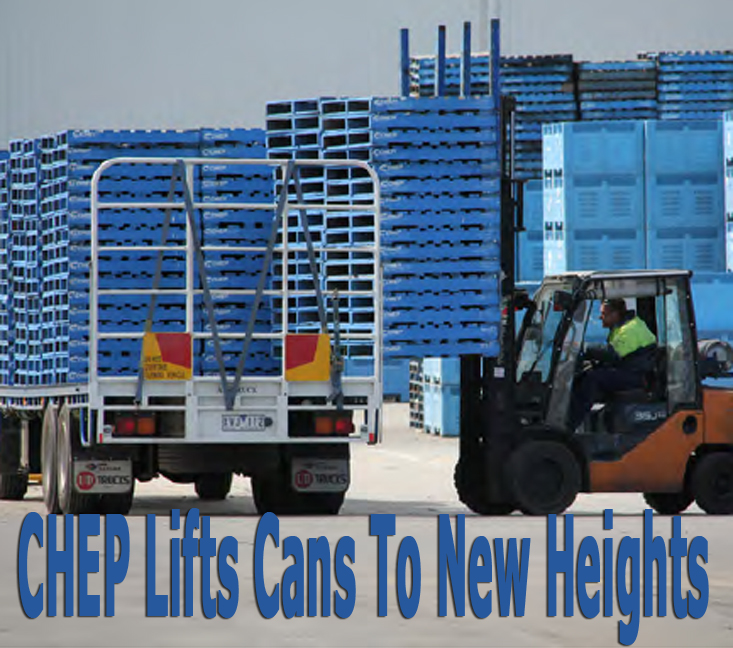 Hailing
from ‘down under,’ with a truly global management team and
offices and operations on three continents, what started out as a series
of strategic acquisitions in 2010 gelled into a corporate presence set
to deliver and grow to fulfill its full potential, as announced at the
press conference held at Air Cargo Americas last Wednesday afternoon.
Hailing
from ‘down under,’ with a truly global management team and
offices and operations on three continents, what started out as a series
of strategic acquisitions in 2010 gelled into a corporate presence set
to deliver and grow to fulfill its full potential, as announced at the
press conference held at Air Cargo Americas last Wednesday afternoon.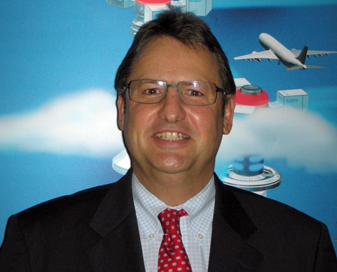 CHEP and its parent company, Brambles,
“the” largest global equipment pooling provider bar none,
evidently made the decision to go after the aviation sector, combining
last year’s acquisition of Unitpool, this year’s deal for
JMI and now Driessen Services into a global pooling solution. The blending
of pooling expertise with service and repair stations, related software
and an original equipment manufacturer all under one roof is unique.
CHEP and its parent company, Brambles,
“the” largest global equipment pooling provider bar none,
evidently made the decision to go after the aviation sector, combining
last year’s acquisition of Unitpool, this year’s deal for
JMI and now Driessen Services into a global pooling solution. The blending
of pooling expertise with service and repair stations, related software
and an original equipment manufacturer all under one roof is unique.
